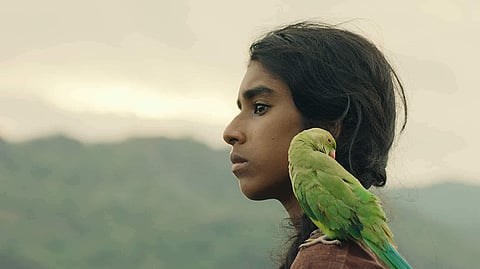Maadathy, an Unfairy Tale Movie Review: Leena Manimekalai’s blazing, poignant tale of terror
Rating:(4 / 5)
Leena Manimekalai’s film, Maadathy - An Unfairy tale, premiered as part of the Coalition of South Asian Film Festival today. Watching Leena’s poignant and powerful film rendered in a stunning visual language, we realise that the tag 'An Unfairy tale' is only too apt. Leena fiercely channels gutting truth, horror and pain in her film, which blends the human and the otherworldly as it blazes against the unnatural and inhuman divisions existing in our cruel society.
Director: Leena Manimekalai
Cast: Semmalar Annam, Ajmina Kassim, Arul Kumar, Patrick Raj
Maadathy bears an unsettling relevance to what is currently happening in our nation where religious and communal tensions are rising to the fore. The opening lines chronicle a truth we often tend to overlook as a society, a truth of terror: “Behind every deity in India, there is a story of injustice.” Empowered by a singular narrative unravelling like a folk tale, the finely-layered social drama is the story of this injustice. Our reverence towards religion is deeply tainted by delusions, insanity, and hypocrisy. With what sanity can you comprehend a country which treats its women in the most despicable of ways and rushes to raise temples for goddesses?
Maadathy is a devastating portrait of the inhumanely ostracised lower caste community called the Puthirai Vannars and how the ruthlessness of caste scorches Yosana, a young girl who hails from the Dalit sect. In an intimate scene, when Yosana confronts her mother who keeps chiding her for roaming in the wild, she is told that the beasts of villagers will never let them live. When we first see the villagers, it is in a painting, and we see them for what they truly are: blind ghosts. The film then transitions breathtakingly from painting to reality, from fable to truth. There is a marvellous prowess in the eloquent cinematic style of Leena that elevates her on par with auteurs like Apichatpong Weerasethakul, the independent Thai filmmaker known for his phantasmagorical political films with mesmeric underpinnings of allegory. Leena’s visual language is painterly, poetic and evocative of wrenching agony.
Yosana, the film’s central character, bears a spirit that yearns to be free and wild, a spirit that naturally yearns to love. Yet, a higher price is asked of her and in harrowing terror, she becomes one with Maadathy. The inverse is also true as the film is revelatory of the dichotomy of the holy and sinful. Yosana (a wonderful Ajmina Kassim) is part of nature, her sole friends being rabbits, pigeons and monkeys in the mountainous forest region where her family resides, away from the village. She splashes around in the waters and when she is wronged, the thundering skies pour down ceaselessly in pain and anger. Leena’s film takes us deep into the forests, where we find the woods at their most liberating, sensual and frightful — it is both chilling and gorgeous. The forest is Yosana’s paradise, refuge and home. When she steps out of the forest, a beastly society preys on her innocence and life.
I can’t resist talking here about a rousing sequence of female desire in Maadathy, which reveals with striking power why female gaze in cinema is refreshing and beautifully sensitive. It is a brief lyrical sequence which I honestly did not think I would see soon in a Tamil film. It is a moment of a girl’s first rush of desire, her sexual awakening when she spots a man bathing nude in the cascade waters. Karthik Raja’s haunting melody subtly underscores the ecstatic bliss of the moment. His music shifts magically from melody and melancholy to thumping rustic folk.
These wondrous scenes of beauty aside, the horror in Maadathy is visceral. After Yosana’s mother is abused, she takes out her rage on the clothes she washes. She maniacally beats them on the washing rocks and rends the clothes. It is excruciatingly gutting that even her sole vent could land the family in trouble with the village.
A fantastically-made independent film rooted in the ugly reality and irony of India, Leena’s Maadathy is a rare tale of oppression that gushes with the frenzy of terror and ventures into an inventive genre. Leena Manimekalai is a definitive voice in Indian independent cinema, and her Maadathy: an Unfairy Tale remarkably exudes the power of cinema, of storytelling that is poignantly reflective of a society where legends of sin circle and haunt our deities.


